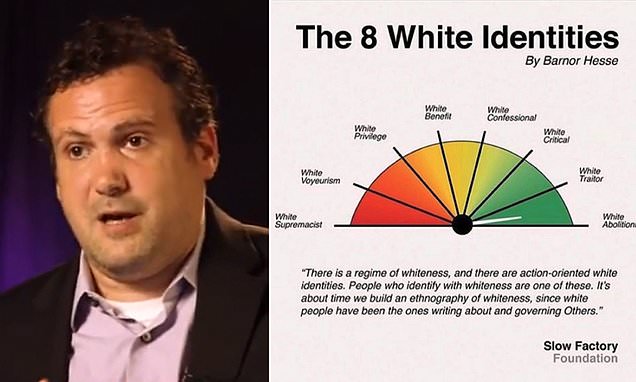Okay, so here's the deal.
First, whether I'm talking about Hesse or my own ideas, we need to start with the understanding that whiteness is something that happens to you. It's not a choice. Most identities are self-identities these days. You identify as a religion. Or not. You identify as LGBT. Or not. Etc. But with race, you don't really get to do that. Society identifies you, and if you try to change your identity, woe is you (see: Rachel Dolezal). So whiteness isn't something we choose or take. It's generally something that is bestowed upon us.
Second, on Hesse's formulation of white identity.
I think it's fundamentally flawed, mostly because it conflates the vast majority of white people in its first two groups, and then draws fine lines between the remaining minority. I think there are miles of difference between his White Supremacists and White Voyeurs, and the idea that they should be right next to each other on one end of the spectrum, while there are six other variations on white on the other side is just plain silly to me.
But, I do think it's valuable to think about simply because it represents a non-white view of what whiteness means, and if we are going to talk about whiteness, I don't think we should limit ourselves to how white people view it. We need to also understand how non-white people view whiteness, and so Hesse's framework is worthy of examination for that reason alone. If, in fact, it turns out his formulation accurately represents how a significant number of non-white people view whiteness, then it is very worthy. I think it's wrong and silly, but I'm white. I have a certain perspective of whiteness very different from non-white people. If most non-white people don't think his formulation is wrong and silly, then it is important for me to understand why they view whiteness so differently than I do.
Third, on my formulation of whiteness.
I think in America whiteness is mostly a binary state. Either you are white, or you are not. We don't really have different levels of white. People of mixed ancestry are generally considered non-white. Someone with a black mother and white father might be called mixed, and he might be called black, but he's very unlikely to be called white. He's probably more likely to be called "light-skinned black" than he is "white."
So whiteness is a very special club that you can't join. You're either born in it, or you're not. The real study of whiteness in America should be less about the identities Hesse delineates, and more about understanding the various advantages and disadvantages (mostly advantages) society confers upon you after determining that you are a member of the club. The principal in question (although I struggle to believe he really understands this himself) raises an important question in bringing up Hesse's formulation, but it's not about the different white identities. It's really about how white people respond to the fact of their own whiteness. To me, the primary question is, "Do we recognize the advantages given us on account of our whiteness?" If we do that, then everything else becomes somehow easier.
This isn't to say that whiteness determines everything. There are other things that society or circumstance push onto our shoulders that matter, too. As Bulworth said, "White people got more in common with colored people than they do with rich people." So we have to talk about all of these things in context, and not let one single difference dominate the entire conversation. But one thing we absolutely should not do is pretend it isn't real. Whiteness is a real thing, it's something that we as individuals don't get to choose, and whether or not we possess it absolutely has real effects on our lives.
/serve



